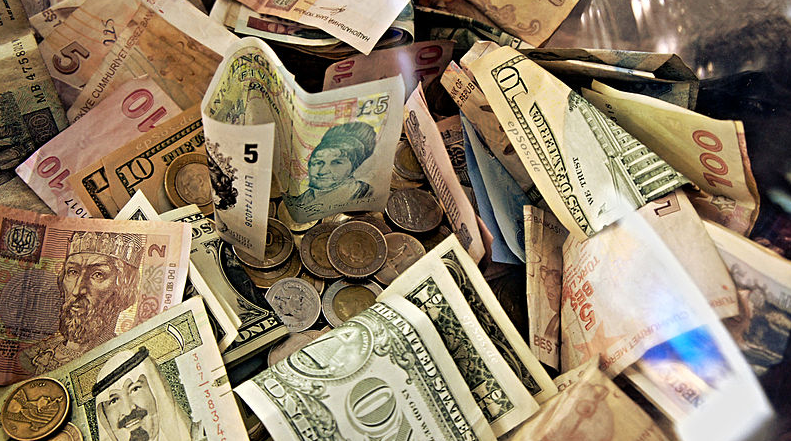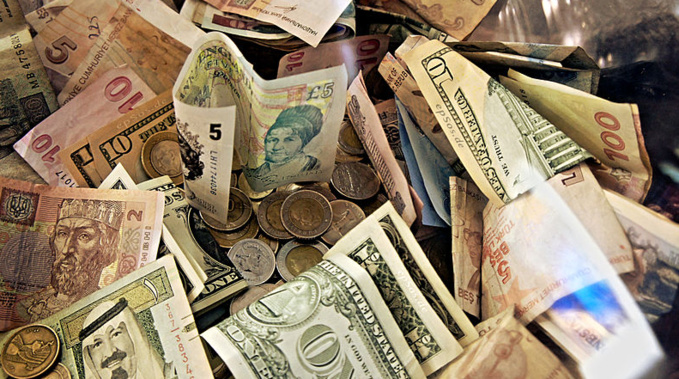In recent years, the RMB has become the most actively traded currency in developing countries. At that, London let Asian markets have part of the share.
The US dollar is still the most traded currency, leading by a wide margin. It gripped 87.6% of transactions conducted in foreign exchange markets. Share of transactions with the second leading euro dropped to 31.3%. Combined share of currencies of developing countries rose from 18.8 to 21.2% over three years. What’s interesting, the RMB almost doubled its share to 4%, or $ 202 billion per day. This allowed the Chinese currency to become the eighth in the world, and first among developing countries for the trade activity, surpassing the Mexican peso. As noted by the BIS, this is largely due to the fact that approximately 95% of volume of transactions in the Chinese currency fell to a couple of RMB/dollar.
Currency trading is still concentrated in the major financial centers. Now, 77% of foreign exchange transactions are carried out in the UK, USA, Singapore, Hong Kong and Japan. London has long been a favorite place of the global foreign exchange market, partly due to its favorable time zone. Daylight hours in London coincide with evening in Asia and morning in the Americas. However, share of the UK fell for the first time in 15 years - to 37.1% compared to 40.8% in 2013. At the same time, three major markets of Asia - Tokyo, Hong Kong and Singapore - together increased their share from 15.4 to 20.7%. The United States, which share rose from 18.9 to 19.4%, are in second place.
It would be difficult for London to regain lost ground after the Brexit referendum, writes the Financial Times. The referendum subjected London to a risk of losing the right to be engaged in clearing transactions denominated in euros. Besides, foreign banks may also move their European headquarters to EU cities. "Events of the last two months suggest that there is a risk of further reduction of London’s share " - says CEO of CLS Bank David Puth.
BIS believes that the volume of global currency trading shrunk partly due to strengthening of the dollar. At constant exchange rates, volume of the past three years has increased by 3.5%, although the growth slowed down dramatically (34% in 2010-2013). This is a sign that the banks and hedge funds have reduced their activity against the backdrop of stricter regulation, notes The Wall Street Journal. For example, the United States adopted "Volcker rule", prohibits banks to trade on their own funds. According to general director of trading firm Pragma Securities David Mechner, the market has seen significant changes caused patchily by the fact that banks started to "allocate capital as efficiently as possible because of ongoing tightening of regulation."
source: wsj.com, ft.com
The US dollar is still the most traded currency, leading by a wide margin. It gripped 87.6% of transactions conducted in foreign exchange markets. Share of transactions with the second leading euro dropped to 31.3%. Combined share of currencies of developing countries rose from 18.8 to 21.2% over three years. What’s interesting, the RMB almost doubled its share to 4%, or $ 202 billion per day. This allowed the Chinese currency to become the eighth in the world, and first among developing countries for the trade activity, surpassing the Mexican peso. As noted by the BIS, this is largely due to the fact that approximately 95% of volume of transactions in the Chinese currency fell to a couple of RMB/dollar.
Currency trading is still concentrated in the major financial centers. Now, 77% of foreign exchange transactions are carried out in the UK, USA, Singapore, Hong Kong and Japan. London has long been a favorite place of the global foreign exchange market, partly due to its favorable time zone. Daylight hours in London coincide with evening in Asia and morning in the Americas. However, share of the UK fell for the first time in 15 years - to 37.1% compared to 40.8% in 2013. At the same time, three major markets of Asia - Tokyo, Hong Kong and Singapore - together increased their share from 15.4 to 20.7%. The United States, which share rose from 18.9 to 19.4%, are in second place.
It would be difficult for London to regain lost ground after the Brexit referendum, writes the Financial Times. The referendum subjected London to a risk of losing the right to be engaged in clearing transactions denominated in euros. Besides, foreign banks may also move their European headquarters to EU cities. "Events of the last two months suggest that there is a risk of further reduction of London’s share " - says CEO of CLS Bank David Puth.
BIS believes that the volume of global currency trading shrunk partly due to strengthening of the dollar. At constant exchange rates, volume of the past three years has increased by 3.5%, although the growth slowed down dramatically (34% in 2010-2013). This is a sign that the banks and hedge funds have reduced their activity against the backdrop of stricter regulation, notes The Wall Street Journal. For example, the United States adopted "Volcker rule", prohibits banks to trade on their own funds. According to general director of trading firm Pragma Securities David Mechner, the market has seen significant changes caused patchily by the fact that banks started to "allocate capital as efficiently as possible because of ongoing tightening of regulation."
source: wsj.com, ft.com



















